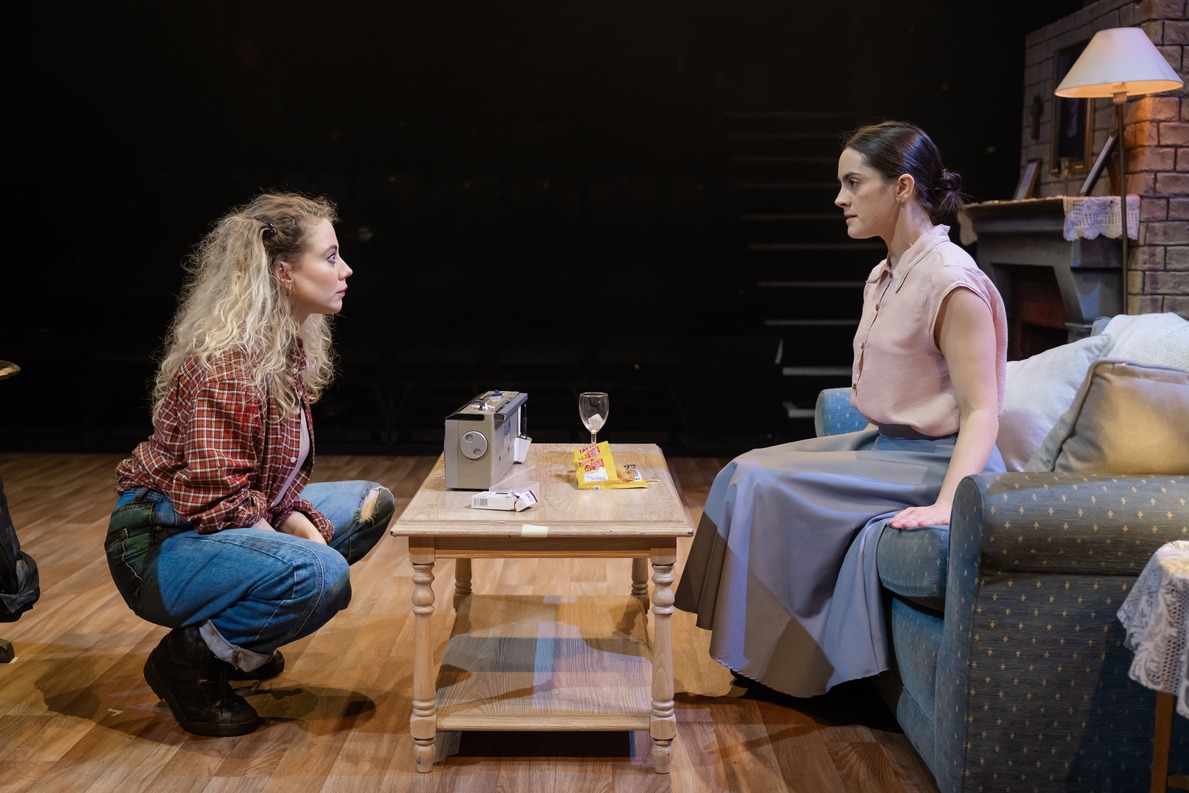Review: CROCODILE FEVER at the Arcola Theatre
Feminine rage, generational trauma, and violent revenge all come together in the London premiere of Meghan Tyler’s Crocodile Fever, where a family drama takes a dark turn into a gore-splattered bloodbath. It's deliciously bizarre and surreal, with an unhinged sense of absurdist comedy, but goes off the rails slightly towards the end.
 Meghan Tyler and Rachael Rooney in CROCODILE FEVER at the Arcola Theatre. Photo by Ikin Yum.
Meghan Tyler and Rachael Rooney in CROCODILE FEVER at the Arcola Theatre. Photo by Ikin Yum.
Set in South Armagh during the Troubles, Crocodile Fever opens with Fianna Devlin climbing through the window of her childhood home after eleven years away, eight of those which were spent in jail. Inside, her older sister Alannah, who has been compulsively scrubbing the already pristine kitchen, is less than happy to see her. Over the course of the night, the push-and-pull between the estranged sisters will unravel into a confrontation with the truth about the fire that killed their mother and a vengeful showdown with their abusive, now bedridden, father.
Meghan Tyler and Rachael Rooney are sublime as this pair of complicated sisters. Tyler’s Fianna enters the scene as a swaggering, punkish IRA rebel, quick with a quip and filled with mocking irreverence about her circumstances - which makes it all the more heartbreaking when we see her regress into a stuttering, frightened girl before her father. Rooney plays the uptight, religious Alannah with an attention to detail that makes her both pitiful and endearing. She is precise and almost robotic in everything she does, from making toast to pouring herself a drink, and with each drink she becomes more and more unhinged and erratic.
The dynamic between the sisters, equal parts entertaining and painful to behold, is the true heart and soul of the play. From their rapid-fire banter as they revisit old memories and poke at each other’s flaws, to the seamless way they go from brawling over a stereo to singing along to Toto’s ‘Africa’, they feel deeply authentic as siblings. Over the course of the play, the role reversal between them is subtle but striking, as the rebellious Fianna finds herself turning into the voice of reason, while the rule-abiding Alannah becomes gleefully committed to the violent trajectory their night takes.
Stephen Kennedy is terrifying as the girls’ father, switching effortlessly from frail, pitiful invalid to an abuser who manipulates them and causes both sisters to shrink in his presence, while the true nature of the abuse he inflicted on them (hinted to be sexual as well as physical) is never fully explained but lurks horrifyingly in the periphery. He becomes synonymous with the allegory of the crocodile that Fianna recounts: how the people of the Asmut tribe in the Amazon believe the giant, man-eating crocodiles to be reincarnations of evil people, perpetuating a cycle of violence that can only be ended by killing, skinning, dismembering, and eating the crocodile. It’s a handy metaphor for living with an abusive parent, and for the backdrop of the Troubles in Northern Ireland, and the story inspires the sister's bloody methods of revenge.
Merve Yoruk’s set is an intricately detailed replica of a working class home, and the intimacy of the space and our proximity to the stage makes it all the more immersive - and all the more visceral as the pristine, tidy kitchen becomes more and more dishevelled over the course of the play. Somehow the sight of scattered, crushed crisps and empty bottles and clouds of cigarette smoke feels as disturbing as the blood, body parts, and overturned furniture that fill the kitchen by the end, a striking testament to how much Mehmet Ergen's direction forces us to become invested in this world.
Comedy and horror go hand in hand, mixing in ways that are outrageous, absurd, and delightful. The sisters' bickering leads them into random but charming digressions, with a particular highlight being Alannah’s drunken and utterly incorrect analysis of the song ‘Africa’, whose lyrics she’s confidently misheard her whole life. The humorous and over-the-top depiction of gore and violence feels very Tarantino-esque: there's a comically large chainsaw, severed legs in the stew, and the sisters' dismembered father awkwardly eats crisps on the couch while they dance around the kitchen covered in his blood.
But, by the end of the short and hastily paced second act, it begins to feel a bit too over-the-top and cartoonish, even with the suspension of disbelief triggered by the play's sense of surrealism. The bizarre ending had me wondering if it was meant to be a hallucination caused by Alannah’s shattered psyche or a very heavy-handed metaphor. The haunting and eerie allusions to the crocodile become a bit too on the nose, which detracts from the subtleties and complexities of the family dynamic and exploration of generational trauma that the play set out to explore.
Crocodile Fever is playing at the Arcola Theatre until November 22nd.
Latest News

 Further cast announced for UK and Ireland tour of Annie
29 January 2026 at 15:10
Further cast announced for UK and Ireland tour of Annie
29 January 2026 at 15:10

 The Donmar Warehouse announces programme for 2026
29 January 2026 at 14:30
The Donmar Warehouse announces programme for 2026
29 January 2026 at 14:30

 Review: FISH BOWL at Peacock Theatre
29 January 2026 at 13:58
Review: FISH BOWL at Peacock Theatre
29 January 2026 at 13:58

 Regent's Park Open Air Theatre announces 2026 season
29 January 2026 at 10:34
Regent's Park Open Air Theatre announces 2026 season
29 January 2026 at 10:34
